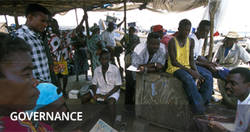
An efficient urban food policy needs a broad involvement of stakeholders, allowing horizontal (at the local level), vertical (with other territorial levels), and multisectorial coordinations. Such governance mechanisms are not easy to set.
That is why this section shares examples of participatory multi-level food governance, multi-stakeholder platforms or food councils, education and awareness raising campaigns, open data of food policies, internal organizations of local governments, partnerships with civil society, the private sector, universities and international organizations.
Related Resources
Governance and planning - Reports & Case Studies
Outh African municipalities are facing unprecedented challeges in the face of climate-related shocks and stresses, and will face more in the future. While often overlooked, investment in nature-based solutions or nature-based infrastructure can support the reduction in carbon emissions and increase the resilience of municipalities to projected climate and environmental...
South Africa (Africa)
2021 - Coll.
Governance and planning - Guidelines
Nature-based solutions are approaches that use nature and natural processes for delivering infrastructure, services, and integrative solutions to meet the rising challenge of urban resilience. Despite the growing demand for nature-based solutions (NBS) in cities to face resilience challenges, many people who make planning, financing, and technical decisions for urban resilience...
(Global coverage)
2021 - Coll.
Governance and planning, Food production and ecosystem management, Food supply and distribution - Reports & Case Studies
This factsheet provides information on the general knowledge collected by the City region food system (CRFS) project in its phase 2 regarding the assessment of risks for the CRFS of Antananarivo. The data was collected through literature review and stakeholder consultations. Some priorities are identified to increase the CRFS resilience...
Madagascar (Africa)
2021 - Coll.
Governance and planning - Guidelines
Participation and citizen engagement are fundamental elements in urban regeneration and in the deployment of nature-based solutions (NBS) to advance sustainable urban development. Various limitations inherent to participatory processes concerning NBS for inclusive urban regeneration have been addressed, and lessons have been learnt. Specifically, this paper investigates participation and urban...
(Europe)
2021 - Nunes, N.; Björner, E.; Hilding-Hamann, K.E.
Governance and planning, Food production and ecosystem management - Reports & Case Studies
Highly populated, developed areas, such as urban areas, have characteristics that can exacerbate detrimental effects of climate change on soil biodiversity such as, decreased albedo, sealed pavement, soil compaction, and propagation of non-native plant species. Managing urban landscapes for the maintenance of diverse microbial and faunal communities can reduce inputs,...
(Global coverage)
2021 - Global Soil Biodiversity Initiative
